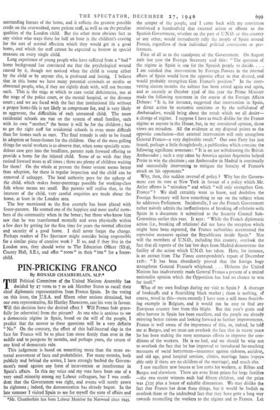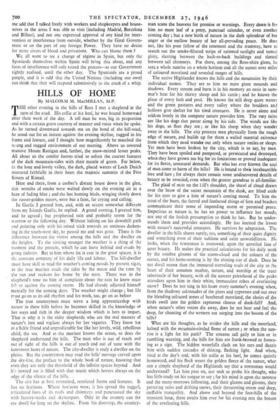PIN-PRICKING FRANCO
By RONALD CHAMBERLAIN, M.P.•
THE Political Committee of the United Nations Assembly has decided by 27 votes to 7 to ask Member States to recall their chief diplomatic representatives from Franco Spain. In the voting on this issue, the U.S.A. and fifteen other nations abstained, but our own representative, Sir Hartley Shawcross, cast his vote in favour. Will this decision have the desired effect ? Will Franco fade grace- fully (or otherwise) from the picture? As one who is anxious to see a democratic regime in Spain, based on the will of the people, I predict that the answer to these questions will be a very definite " No.", On the contrary, the effect of this half-hearted slap in the face for Franco will be to place him more firmly than ever in the saddle and to postpone by months, and perhaps years, the return of any kind of democratic rule.
This judgement is based on something more than the mere ex- ternal assessment of facts and probabilities. For many months, both publicly and behind the scenes, I have strongly backed the Govern- ment's stand against any form of intervention or interference in Spain's affairs. In this my voice and my vote have been one of a very small minority among my Labour colleagues, but I was confi- dent that the Government was right, and events will surely prove its rightness ; indeed, the demonstration has already begun. In the late summer I visited Spain to see for myself the state of affairs and *Mr. Chamberlain has been Labour Member for Norwood since 1945. the temper of the people, and I came back with my conviction reinforced a hundredfold that external action or affront to the Spanish Government, whether on the part of U.N.O. or this country or any other, would immediately rally the people of Spain around Franco, regardless of their individual political convictions or pre- ferences.
First of all as to the standpoint of the Government. On August loth last year the Foreign Secretary said this : "The question of the regime in Spain is one for the Spanish people to decide. . . . I am satisfied that intervention by Foreign Powers in the internal affairs of Spain would have the opposite effect to that desired, and would probably strengthen Gen. Franco's position." In the inter- vening sixteen months the subject has been raised again and again, and as recently as October 23rd of this year the Prime Minister made the following statement in the course of the Foreign Affairs Debate: " It is, for instance, suggested that intervention in Spain, or direct action by economic sanctions or by the withdrawal of Ambassadors, would bring about the result which we all desire- s change of regime. I suppose I have as much dislike for the Franco regime as anyone in the House, but, in my considered opinion, those views are mistaken. All the evidence at my disposal points to the opposite conclusion—that external intervention will only strengthen General Franco—a very deplorable result." Our own Party has just issued, perhaps a little thoughtlessly, a publication which contains the following significant sentences: " It is no use withdrawing the British Ambassador ; such a step taken by America against Argentina helped Per6n to win the elections ; our Ambassador in Madrid is continually and successfully intervening to mitigate the ferocity of Franoo's attack on his opponents."
Why, then, this sudden reversal of policy ? Why has the Govern- ment cast its vote at New York in favour of a policy which. Mr. Attlee affirms is " mistaken" and which " will only strengthen Gen. Franco " ? We shall certainly want to know, and doubtless the Foreign Secretary will have something to say on the subject when he addresses Parliament. Incidentally, I see the French Government rather naively admits the ineffectiveness of breaking off relations with Spain in a document it submitted to the Security Council Sub- Committee earlier this year. It says: " While the French diplomatic action (i.e., breaking off relations) did not have the reception which might have been expected, the Franco authorities accentuated the repressive measures against the Republicans inside Spain." Nor will the members of U.N.O., including this country, overlook the fact that all reports of the last few days from Madrid demonstrate the futility of the action which U.N.O. has taken. Here, for instance, is an extract from The Times correspondent's report of December 11th : " It has been abundantly proved that the foreign bogy strengthens General Franco's whiphand. . . . Hitherto the United Nations has inadvertently made General Franco a present of a united nationalist opinion which the Opposition has had no chance to win for itself."
What of my own findings during my visit to Spain ? A shortage of foodstuffs and a flourishing black market ; there is nothing, of course, novel in this—more recently I have seen a still more flourish- ing example in Belgium, and it would not be easy to find any European country free from this blight. But this year's grain and olive harvest in Spain has been excellent, and the people are already enjoying better rations and looking forward to further improvements. Franco is well aware of the importance of this, as, indeed, he told me at Burgos, and we must not overlook the fact that in recent years he has been making the most strenuous efforts to improve the con- ditions of the workers. He is no fool, and we should be wise not to overlook the fact that he has improved or introduced far-reaching measures of social betterment—insurance against sickness, accident, and old age, good hospital services, clinics, marriage loans (repayi able only if there are no children of the marriage), and much else.
I saw excellent new houses at low rents for workers, at Bilbao and Burgos and elsewhere. There are even State prizes for large families —the two recent winners each had fifteen children, and the prize was £125 plus a house of suitable dimensions. We may dislike the fact that Franco has done these things, but it would be foolish to. overlook them or the undoubted fact that they have gone a long way towards reconciling the workers to the regime and to Franco. Let
me add that I talked freely with workers and shopkeepers and house- wives in the areas I was able to visit (including Madrid, Barcelona and Bilbao), and not one expressed approval of any kind for inter- vention or interference from outside, whether by the Giral Govern- ment or on the part of any foreign Power. They have no desire for more rivers of blood and privations. Who can blame them ?
We all want to see a change of regime in Spain, but only the Spaniards themselves within Spain will bring this about, and any form of interference will only retard the process—as our Government rightly realised, until the other day. The Spaniards are a proud people, and it is odd that the United Nations (including our own) can think that they will respond submissively to the crack of a whip.































 Previous page
Previous page